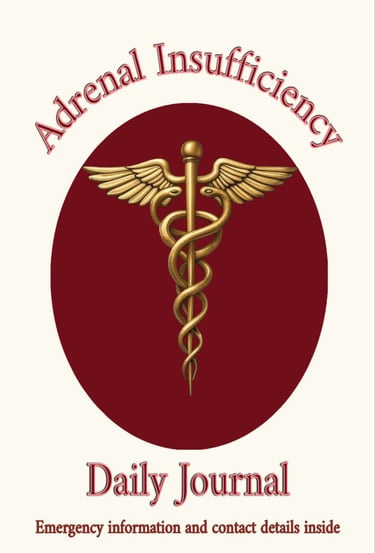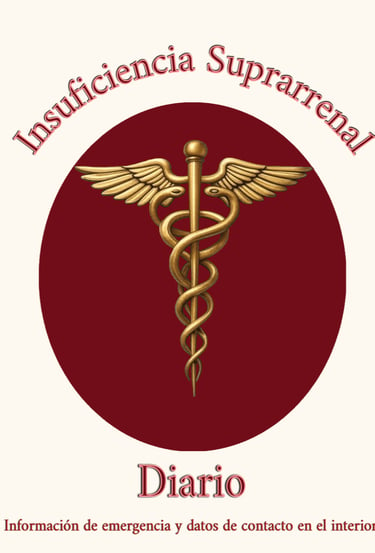Transform Your Wellness with Health Tracking Journals
Discover how health tracking journals can revolutionize your wellness routine, especially for those living with adrenal insufficiency or Addison's disease. Learn to navigate symptoms and medication management effectively.
HEALTH
7/26/20256 min read
Taking Control: How a Daily Journal Can Transform Life with Adrenal Insufficiency
Living with adrenal insufficiency or Addison's disease can feel like navigating a complex maze of symptoms, medications, and daily health decisions. Every day brings new challenges as your body struggles to produce the cortisol it needs to function properly. But what if there was a simple yet powerful tool that could help you regain control, spot patterns, and work more effectively with your healthcare team?
Enter the daily health journal—a game-changing companion that's transforming how people manage adrenal insufficiency.
The Hidden Challenge of Adrenal Insufficiency
Adrenal insufficiency affects thousands of people worldwide, yet it remains one of those "invisible" conditions that can be incredibly difficult to manage. Unlike conditions with obvious external symptoms, adrenal insufficiency manifests through fatigue, dizziness, nausea, salt cravings, and mood changes that can vary dramatically from day to day.
The unpredictable nature of symptoms makes it challenging for both patients and doctors to understand what's working and what isn't. How do you explain to your endocrinologist that Tuesdays seem to be your worst days, or that you've noticed your energy crashes every time you have a stressful meeting at work? These patterns are crucial for proper treatment, but they're nearly impossible to track without a systematic approach.


Why Journaling Works: The Science Behind Daily Tracking
Research consistently shows that patients who actively track their health conditions have better outcomes. For adrenal insufficiency specifically, daily monitoring serves several critical purposes:
Pattern Recognition: Your body is constantly sending signals about how well your hormone replacement therapy is working. By tracking symptoms, energy levels, stress triggers, and medication timing, you begin to see patterns that might otherwise go unnoticed.
Medication Optimization: Timing is everything with hormone replacement therapy. A daily journal helps you and your doctor identify whether your current dosing schedule is optimal or if adjustments might help you feel better.
Crisis Prevention: Perhaps most importantly, consistent tracking can help identify early warning signs of an adrenal crisis—a life-threatening emergency that requires immediate medical attention.
Empowered Healthcare Conversations: Instead of trying to remember how you've been feeling over the past three months, you arrive at appointments with concrete data that helps your healthcare team make informed decisions.
Essential Elements of an Effective Adrenal Insufficiency Journal
The most effective health journals for adrenal insufficiency include several key components below:
Daily Health Metrics
Overall feeling and energy levels: Using simple scales or visual indicators to track how you're feeling each day
Stress levels and triggers: Identifying what situations or events tend to worsen your symptoms
Sleep quality and duration: Since poor sleep can significantly impact cortisol needs
Fluid and sodium intake: Crucial for people with adrenal insufficiency who often need increased salt intake
Medication Tracking
Timing and dosages: Recording when you take each medication and the exact dose
Missed doses: Tracking any forgotten medications and how you felt afterward
Side effects: Noting any unusual reactions or symptoms after taking medication
Symptom Monitoring
The journal should include space to track common adrenal insufficiency symptoms such as:
Fatigue and weakness
Dizziness or lightheadedness
Nausea or stomach pain
Salt cravings
Mood changes
Muscle weakness
Weekly Reflection Pages
Beyond daily tracking, weekly summary pages help identify broader patterns and prepare for doctor visits. These might include questions about:
Most common symptoms experienced that week
Medication adherence and any dosing changes
Major stressors and how they were managed
Energy patterns throughout the week
Questions to discuss with your healthcare team




The Emergency Preparedness Component
One of the most critical aspects of managing adrenal insufficiency is being prepared for an adrenal crisis. A comprehensive health journal should include:
Emergency contact information with doctor details, emergency contacts, and current medications clearly listed
Crisis recognition guide outlining the warning signs of adrenal crisis
Emergency action plan with step-by-step instructions for stress dosing and when to seek immediate medical help
Medical alert information that can be quickly accessed by first responders
Having this information organized and easily accessible can literally be life-saving during an emergency.


Making Journaling Sustainable: Tips for Success
Starting a health journal is one thing; maintaining it consistently is another. Here are strategies that help people stick with their journaling routine:
Keep it simple: Choose a format that takes no more than 5-10 minutes to complete each day. Overly complex tracking systems often get abandoned.
Make it routine: Link journaling to an existing habit, like taking your morning medication or having your evening tea.
Focus on patterns, not perfection: Missing a day or two isn't the end of the world. The goal is to capture enough information to identify trends.
Celebrate insights: When you discover a pattern—like realizing you feel better when you eat more salt or that certain activities drain your energy—celebrate these victories!
Share with your healthcare team: Bring your journal to appointments and discuss what you've learned. Most doctors appreciate patients who take an active role in their care.
The Lifestyle Connection: Beyond Medication Management
While medication is crucial for managing adrenal insufficiency, lifestyle factors play an enormous role in how well people feel day-to-day. A comprehensive journal helps track how various lifestyle elements affect your wellbeing:
Nutrition and hydration: People with adrenal insufficiency often need more sodium and may benefit from specific eating patterns. Tracking food intake alongside symptoms can reveal important connections.
Physical activity: Finding the right balance of activity—enough to support overall health without overtaxing an already stressed system—is crucial.
Stress management: Since stress directly impacts cortisol needs, tracking stress levels and effective management techniques is essential.
Sleep patterns: Quality sleep supports overall health and can impact how well your body utilizes hormone replacement therapy.
Technology vs. Paper: Finding What Works for You
Today's health journaling options range from traditional paper journals to sophisticated smartphone apps. Each has advantages:
Paper journals offer:
No battery requirements or technical issues
Easy to share with doctors
No concerns about data privacy
Tactile experience that some find more engaging
Digital options provide:
Automatic reminders and prompts
Easy data analysis and pattern recognition
Backup capabilities
Integration with other health apps
The best choice is the one you'll actually use consistently.
Building Your Healthcare Team Partnership
A well-maintained health journal transforms your relationship with your healthcare providers. Instead of vague reports about "not feeling well," you can provide specific data about symptom patterns, medication effectiveness, and lifestyle factors.
This detailed information helps your endocrinologist make more informed decisions about medication timing, dosing adjustments, and lifestyle recommendations. It also demonstrates your commitment to managing your condition, which often leads to more collaborative and effective care.
Looking Forward: The Empowerment Factor
Perhaps the most significant benefit of consistent health journaling is the sense of control and empowerment it provides. Living with a chronic condition like adrenal insufficiency can sometimes feel overwhelming, but having concrete data about your health helps shift the narrative from "victim of unpredictable symptoms" to "active participant in my health management."
Many people find that journaling helps them identify their own expertise about their condition. You become the expert on your own body's patterns and responses, which is invaluable information that no test or examination can provide.
Getting Started: Your First Steps
If you're ready to begin your health journaling journey, start simple:
Choose your format: Decide between paper or digital based on your preferences and lifestyle
Start with basics: Focus on just a few key metrics initially—overall feeling, energy level, and medication timing
Set a routine: Pick a consistent time each day for your entries
Plan for emergencies: Set up your emergency contact information right away
Schedule a review: Plan to look for patterns after your first month of tracking
The Bottom Line
Managing adrenal insufficiency requires more than just taking medication—it requires understanding your body's unique patterns and needs. A daily health journal serves as both a practical management tool and a pathway to empowerment.
While everyone's experience with adrenal insufficiency is different, the act of paying attention to your body's signals and tracking what helps or hurts creates a foundation for better health management. Combined with proper medical care, this self-awareness can significantly improve your quality of life and help you feel more confident in managing your condition.
Remember, this journal is a tool to support—not replace—professional medical care. Always work closely with your endocrinologist or healthcare team, and don't hesitate to seek immediate medical attention if you experience signs of an adrenal crisis.
Your health journey with adrenal insufficiency is unique to you, but you don't have to navigate it alone. With the right tools, support, and medical care, it's possible to live a full, active life while managing this condition. A daily health journal might just be the key to unlocking better days ahead.








